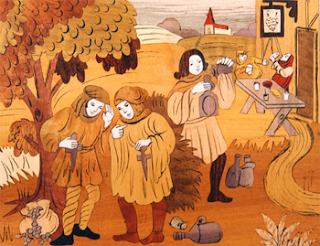 One of the most famous of the Canterbury Tales is the
"Pardoner's Tale," which we read today. Of course, Chaucer is being ironic with the avarice-driven Pardoner telling a story of the evils of greed, but which element /event of irony in the story did you find most humorous or edifying? Give the line and identify the type of irony being used and explain what you liked about it. Make sure you don't use the same example as the poster prior to you. (The deadline to post a response is midnight Thursday, April 4, 2013.)
One of the most famous of the Canterbury Tales is the
"Pardoner's Tale," which we read today. Of course, Chaucer is being ironic with the avarice-driven Pardoner telling a story of the evils of greed, but which element /event of irony in the story did you find most humorous or edifying? Give the line and identify the type of irony being used and explain what you liked about it. Make sure you don't use the same example as the poster prior to you. (The deadline to post a response is midnight Thursday, April 4, 2013.) WELCOME STUDENTS!
This is a place for us to discuss openly and honestly the literature we are reading. Here we are all just communicating our thoughts on what we are reading. There are no right and wrong answers. However, you are expected to be polite, mature, and on topic.
Thursday, April 4, 2013
Just a little ironic story of three friends...
 One of the most famous of the Canterbury Tales is the
"Pardoner's Tale," which we read today. Of course, Chaucer is being ironic with the avarice-driven Pardoner telling a story of the evils of greed, but which element /event of irony in the story did you find most humorous or edifying? Give the line and identify the type of irony being used and explain what you liked about it. Make sure you don't use the same example as the poster prior to you. (The deadline to post a response is midnight Thursday, April 4, 2013.)
One of the most famous of the Canterbury Tales is the
"Pardoner's Tale," which we read today. Of course, Chaucer is being ironic with the avarice-driven Pardoner telling a story of the evils of greed, but which element /event of irony in the story did you find most humorous or edifying? Give the line and identify the type of irony being used and explain what you liked about it. Make sure you don't use the same example as the poster prior to you. (The deadline to post a response is midnight Thursday, April 4, 2013.)
Subscribe to:
Post Comments (Atom)
6 comments:
The story is ironic in various ways. The Pardoner tells a story based on the idea that "Greed is the root of all evil." It is ironic that he tells this story but preaches for money. This type of irony is situational irony. He believes in something but acts the opposite.
"He took a bottle full of poison up/ And drank; and his companion, nothing loath/ Drank from it also, and they perished both." This is an example if dramatic irony from "The Pardoner's Tale" because the readers know that they are drinking poison, but the characters do not. I find it humorous because each one wants to kill the other in order to get the gold, but in the end they are all murdered, and none if them get the gold.
In "The Pardoner's Tale," the rioter says, "And we will kill this traitor Death, I say" (91). This phrase is situational irony because te rioter expects to kill Death, but he is impossible to kill and kills the rioter. I find this humerus because the rioter relieved he could kill something that cannot be defeated. Also, he was killed at the hands of the two men he made a vow with to kill Death.
Chaucer writes, "Let each of us hold up his hand to other and each of us become the other's brother, and we three will go slay this traitor Death" (line 235-237). I found this example of irony humorous because the oldest rioter is telling the other two men that he will never betray them, and he will always be true to them. However, the two older rioters are plotting to kill the youngest one, but they promised that they would always treat him like a brother. This is an example of verbal irony.
Geoffrey Chaucer uses verbal irony in the story "The Pardoner's Tale." In lines 138-141, when the old man speaks to the three men, he says "And therefore it be said, 'Do no more harm to an old man than you, being now young, would have another do when you are old'- if you should live till then." This irony is humorous because the old man knows they cannot conquer Death because he is Death.
Post a Comment